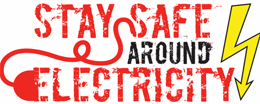We use electricity to cook our food, heat and cool our homes and power our electronics, but it also presents serious dangers. Staying safe around electricity is important!
Electricity attempts to travel to the ground by following the path of least resistance. It travels through conductors, such as metal, water and people. If you touch electricity (or something touching electricity), your body becomes a path for the electricity and you could be seriously injured or killed.
Follow these safety rules:
Power lines
- Power lines transport tremendous amounts of electricity. Contact with a power line can result in serious injuries, burns or death. Stay away from all power lines. Never climb utility poles.
Downed power line
- Accidents, storms or other events may cause a power line to fall to the ground. A wire on the ground may be carrying electricity.
- Don’t go near downed power lines. Assume the power is still on. It could save your life. Immediately call GP&L (972-205-3000) and the police (911) to report a fallen line.
- Instruct others not to go near the downed line.
Objects near or touching power lines
- If a fallen power line is touching someone, stay away and immediately call for help. Don’t touch the person or anything they are touching. Don’t use an object to try to move the line or try to pull the person away from the line, or you may become a victim also.
- If your car is hit by a power line, stay inside unless in immediate danger such as a fire. If you must exit the car, jump clear without touching metal (the car) and the ground at same time.
- Don’t touch a fence that has come in contact with a fallen power line. Metal fences can become electrified if a live wire falls on them.
- Don’t climb trees near electrical wires.
- Don’t fly kites, balloons, airplanes or other objects near overhead lines. A kite or balloon string can conduct electricity to the ground.
- Keep pool skimmer poles away from overhead power lines.
- When carrying ladders and other long tools, be careful and keep them away from all overhead lines, including the line going to your home from the power pole.
- When installing an antenna, be certain there is ample space between it and all overhead power lines. Allow extra space so if it falls it will clear the overhead power lines. Read installation instructions and install only in dry weather.
Service drops
- A service drop is where the wiring comes into a building at the meter. The covering on these wires is not insulation. It is weatherproofing only. If this covering becomes brittle or cracked, it can fall off and expose energized wires.
- Keep ladders away from service drops.
- Use caution when near a service drop, such as when painting or cleaning.
Electrical outlets
- Electrical outlets provide access to electricity. As such, they should be treated with same caution as any other source of electricity.
- Never overload electrical outlets; an overloaded electrical outlet is a fire hazard.
- Don’t put anything but plugs in electrical outlets.
- Use child safety devices such as plastic outlet guards.
- View an infographic about tamper resistance receptacles and child-proofing electric outlets.
- View an infographic about ground fault circuit interrupters.
Electrical appliances and cords
- Once an electrical appliance is plugged in, it is a source of electricity whether it is turned on or off.
- Never use electrical appliances in or near water.
- Always unplug an appliance before cleaning it.
- Appliance cords are covered with insulation for protection. Check cords regularly for wear. Don’t use if cord is cracked or frayed.
- Disconnect appliances by pulling on the plug, not the cord.
- Don’t run electrical cords under rugs or furniture.
- Unplug appliances when not in use. Even if the appliance is turned off, there is still a bit of electricity running through it if it is plugged into an outlet.
- Immediately disconnect an appliance if it blows a fuse or emits smoke or sparks. Have appliance repaired before using it again or discard it.
- Be careful not to cut the power cord when working with outdoor electrical tools such as blowers, hedge clippers, chain saws and more.
- Wear rubber-soled shoes when using electrical appliances outdoors. Do not use electrical tools when barefooted.
- Don’t use electrical appliances outdoors when the ground is damp or wet.
- View an infographic about surge protection.
Information provided by city of Garland.


